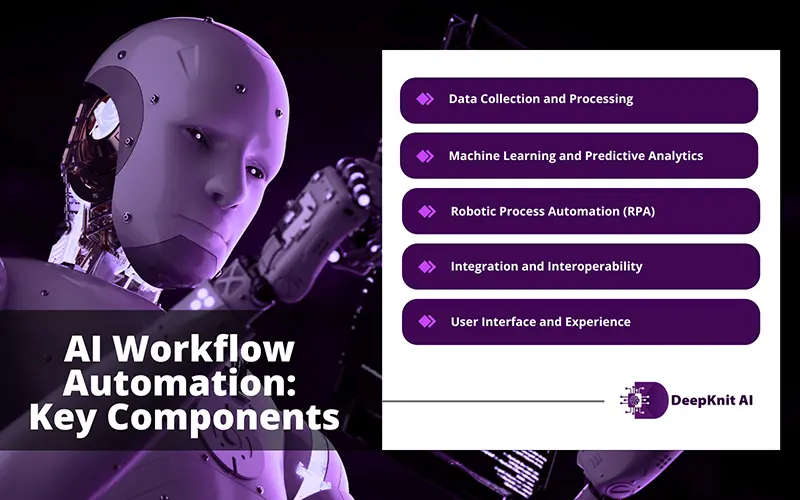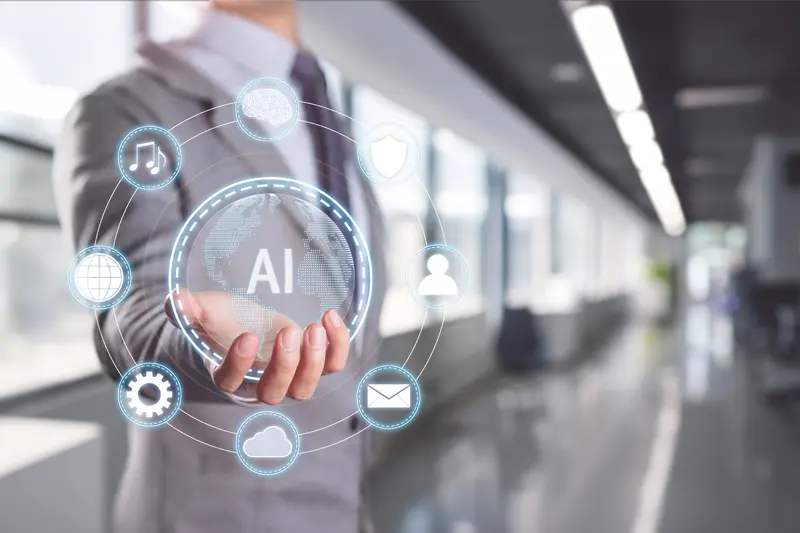Did you know in 2022, a Gartner study predicted that at least 70% of organizations will have adopted some form of automation to deliver flexibility and efficiency by 2025 -a considerable increase from the 20% of organizations in 2021.
And, guess what?
According to a 2025 report by Glide, 73% of companies have already incorporated AI to some degree, with 92% of companies planning to increase their AI investments over the next three years. Over the past couple of years, businesses have understood the significance of adopting AI workflow automation when it comes to staying relevant in today’s ever-evolving digital landscape.
This guide will provide a comprehensive understanding of AI workflow automation and how leveraging these technologies can revolutionize business processes-driving efficiency, reducing costs and enabling opportunities for limitless scalability. For deep insights on state-of-the-art automation technologies for enterprises, visit DeepKnit AI.
What Is AI Workflow Automation?
As the name suggests, AI workflow automation refers to the use of artificial intelligence (AI) technologies like machine learning (ML), natural language processing (NLP), robotic process automation (RPA), and predictive analytics to streamline complex, rule-based tasks, thereby improving decision-making and overall efficiency.
Unlike traditional automation that follows a static script, AI-powered automation is capable of learning, adapting and optimizing processes in real-time. This enables organizations to handle intricate business operations that involve unstructured data and dynamic environments.
Key Components of AI Workflow Automation
- Data Collection and Processing: AI systems can collate large amounts of data from multiple sources. Advanced algorithms are then used to clean, transform, and assess data, ensuring that any subsequent decision-making is based on accurate and relevant information.
- Machine Learning and Predictive Analytics: By leveraging modern AI technologies like ML and NLP, AI can rapidly identify patterns and trends in data. This predictive capability enables proactive adjustments in process management, thereby reducing the risk of any errors and delays.
- Robotic Process Automation (RPA): RPA utilizes software robots to perform high-volume tasks that are otherwise undertaken by humans. A variety of AI enhancements in RPA can make these robots more capable of handling specific, complex tasks that require learning and adaptation.
- Integration and Interoperability: AI workflow automation tools are designed to integrate seamlessly with existing enterprise software systems. This enables a smooth transfer of data across different departments, thereby improving collaboration and reducing silos.
- User Interface and Experience: Intuitive interfaces enable users to promptly monitor workflows and intervene when required. These proactive dashboards provide real-time insights into process performance, enabling continuous improvement.

Transformative Benefits of AI Workflow Automation
Empowering traditional workflows with AI automation brings tangible improvements in overall business performance. Here are some of the key benefits:
- Automating Repetitive Tasks: Monotonous workflow tasks such as data entry, scheduling, and report generation can be fully automated with AI. This not only accelerates the entire process, but also minimizes errors. When companies deploy AI-powered automation, repetitive tasks are managed efficiently, freeing up critical team members for strategic and cogent works.
- Improving Customer Experience: AI-driven tools are capable of handling customer interactions, from chatbot support to personalized communications. By automating responses based on analyzed customer data, businesses can offer accurate support, which enhances the overall customer experience.
- Process Monitoring and Predictive Maintenance: Regular monitoring is what lays a solid foundation for effective workflow management. AI systems have the capability of not only tracking ongoing operations, but also can predict potential issues before they escalate out of control. For example, by analyzing historical data, AI can predict maintenance requirements for machinery and duly notify teams—preventing costly downtime.
- Smooth Integration Across Systems: Modern business environments often rely on multiple workflow management software. AI workflow automation connects these disparate systems, thereby enabling smooth data integration and communication. This interoperability makes information readily available across departments, facilitating a coherent atmosphere.
- Accelerating Decision-making Processes: Real-time data analytics powered by AI can provide immediate insights and recommendations. This accelerates the decision-making process by eliminating the lag time associated with manual data analysis. Quick access to relevant data empowers management to make informed decisions swiftly and accurately.
Real-world Applications of AI Workflow Automation
AI workflow automation is not something that can be built and shared with all; it’s very specialty is its boundless customization capabilities. The system can be tailored to meet the specific needs of various industries. Below are a few examples of how different sectors are leveraging AI for improved operational efficiency:
- Healthcare: In the healthcare sector, AI streamlines tasks like patient data management, appointment scheduling, and even certain diagnostic processes. Automating these tasks considerably reduces wait times and enhances patient care. Additionally, predictive analytics help in identifying underlying diseases based on medical history and recommend treatment plans. AI integration in healthcare is also helping institutions move toward a more proactive and preventative care model, improving long-term outcomes and patient satisfaction.
- Financial Services: Banks and financial institutions use AI to automate tasks like customer onboarding, fraud detection, risk assessment, and compliance reporting. AI’s capability to evaluate vast amounts of data and identify abnormal patterns—in a matter of minutes—helps in identifying and mitigating risks, ensuring regulatory compliance.
- Manufacturing: Manufacturing companies are increasingly shifting towards AI to optimize their production lines through predictive maintenance, quality control, and supply chain management, across multiple workplaces. By integrating AI, manufacturers achieve increased productivity, minimize operational costs, and maintain a high level of quality across all their products.
- Retail and E-Commerce: Retailers use AI to manage operations like handling inventory, personalizing marketing campaigns, and offering top-notch customer service. Automation helps in categorizing order processing, reducing delivery times, and managing customer concerns effectively.
- Human Resources: AI-driven solutions in HR streamline many routine processes such as recruiting, payroll management, and employee engagement. Streamlining candidate screening and onboarding with the help of AI can significantly reduce hiring time, while predictive analytics can help in employee retention and evaluating team performance.
Key Considerations When Implementing AI Workflow Automation
While it seems there are only advantages with adopting AI workflow automation, it also can turn sour if not implemented with careful planning and consideration. Here are some vital factors to consider:
- Data Quality and Integration: Make sure that the underlying data is accurate and properly integrated across systems for optimum result. Poor data quality can lead to misinformed decisions and mitigate the overall impact of automation.
- Change Management: Understand that transitioning to AI-powered workflows require cultural and/or operational shifts within the organization. Efficient change management strategies are needed to train employees, manage resistance, and foster a culture of innovation without disrupting the unity.
- Security and Compliance: A common concern with automation among every type of consumer is data security. And therefore, it is important for organizations to invest in robust security measures to protect sensitive data and also to ensure compliance with industry regulations.
- Continuous Improvement: AI systems thrive on non-stop learning and constant improvement. Regular monitoring and fine-tuning of automated processes are essential to keep pace with changing business needs and technological advancements. If not updated, AI automation will soon turn to be a liability than an asset.
How DeepKnit AI Enhances Business Process Automation
DeepKnit AI (DK AI) is at the forefront of delivering state-of-the-art AI workflow automation solutions. By designing custom solutions that can be integrated with existing business infrastructures, DeepKnit AI can deliver highly scalable and adaptive automation tools built to transform your business operations.
- DeepKnit AI’s USP: DeepKnit AI’s platform was engineered taking into consideration that every aspect of a business’ processes are optimized to achieve maximum efficiency and accuracy. DK AI leverages advanced machine learning techniques with robotic process automation that creates a streamlined, interconnected workflow to take on tasks ranging from data collection and processing to real-time decision-making.
- Customized Solutions for All Industries: Whether your business is in healthcare, legal, finance or retail, DeepKnit AI offers customized solutions that cater to your specific operational challenges. Our extensive industry expertise helps in designing an automation framework that not only simplifies complex tasks but also provides valuable predictive insights. This also includes customized AI solutions for small businesses that seek scalable, efficient tools to boost productivity without stretching their budget.
- Seamless Integration and Onboarding: DeepKnit AI understands that every business is unique and has unique operational requirements as well. Our agile integration process ensures that the implementation of AI-driven workflows is smooth and minimally disruptive. With guided onboarding, your team can quickly adapt to new technologies, paving the way for a more productive future.
- Empowering Your Workforce: By adopting DeepKnit AI, you are empowering your workforce to focus on innovation and strategic decision-making. This shift from manual operations to intelligent automation builds a more dynamic, efficient, and future-proof environment within your organization.
Future Trends in AI Workflow Automation
With businesses racing against the clock to embrace digital transformation and stay competitive, several trends are emerging that would further redefine the field:
- Hyper Automation: Hyper Automation involves the combination of multiple machine learning, packaged software, and intelligent automation tools to create a comprehensive automation framework. This trend is set to drive enterprise-wide innovation by automating not just individual tasks but entire business processes. Organizations are now proactively looking for the best AI automation tools for enterprises to implement such scalable, future-ready solutions.
- AI-driven Decision Intelligence: The integration of advanced analytics with AI will further enhance decision-making capabilities. Future systems will offer prescriptive insights, allowing organizations to not only predict outcomes but also determine the most effective courses of action.
- Natural Language Processing (NLP) Enhancements: Further progression in NLP are making AI systems more adept at understanding and processing human language. This will lead to improved customer interactions and more intelligent workflow management solutions.
- Ethical AI and Governance: With the increasing reliance on AI, there is a growing emphasis on ethical AI practices and robust governance frameworks. Ensuring that AI systems operate transparently and equitably will be a priority for businesses and regulators alike.
Conclusion
AI workflow automation represents a transformative shift in how modern businesses operate. Its ability to streamline repetitive tasks, enhance data-driven decision-making, and reduce costs offers a competitive edge that is difficult to match. By investing in AI automation, companies can reallocate valuable resources toward innovation and strategic growth.
DeepKnit AI stands as a beacon of excellence in the realm of AI-driven automation, providing tailored, scalable, and high-performance solutions that empower businesses to thrive in a dynamic environment. Through continuous learning, seamless system integration, and robust security measures, we ensure your organization is well-prepared for the future.
By embracing AI workflow automation, you are not only taking a futuristic step towards elevated operational efficiency, but also paving the way for much improved and intuitive customer experiences, data integrity, and long-term success.
Revolutionize Your Workflow with Intelligent Automation
Take your operational workflow to the next level with DeepKnit AI!

